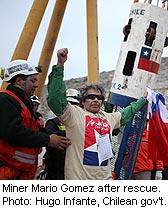
WEDNESDAY, Oct. 13 (HealthDay News) — As the world held its breath Wednesday, transfixed by the rescue of the 33 Chilean miners who had been trapped underground for 69 days, early indications were that the men had survived their ordeal in surprisingly good health.
After the first wave of miners reached the Earth’s surface, Chile’s health minister, Jaime Manalich, told a news conference that all the men were in good shape, and none had required any special medication, the Associated Press reported.
“Things are going extraordinarily well so far,” Manalich said. “We have had very, very minor problems.”
By late Wednesday, the last of the miners had been transported to safety.
But medical experts cautioned that the rescue of the miners was just the first step on a longer road to recovery. Among the health concerns: the lingering effects of lack of sunlight, lack of sleep, poor nutrition and poor sanitation.
The miners’ mental health is also a concern. They must be reintroduced to their families and society and deal with their sudden celebrity status.
No one in recorded history has survived as long trapped underground as the 33 men, the AP reported.
The miners, who were evacuated with a rescue capsule that traveled up and down a 2,041-foot escape shaft, were switched to a liquid diet six hours before their rescue to reduce the chances of vomiting as they were pulled to the surface. And because of their long confinement, the men were given special sunglasses to wear to make sure they didn’t suffer damage to their retinas when they returned to the mouth of the mine, CNN reported.
While the rescue workers and the medical team on site tried to anticipate any potential physical problems, the psychological problems facing the miners may be more challenging, experts said.
“The initial problems, such as being short of breath because of some potential lung problems, and problems of low blood pressure causing dizziness or fainting, were really planned well for,” said Dr. Shirin Shafazand, an assistant professor of pulmonary, critical care and sleep medicine at the University of Miami Miller School of Medicine.
“They have tried to think about problems that can happen immediately and provide some preventive measures,” Shafazand said. “What is important now are the medium- and long-range problems they might have.”
The miners should have their kidney and heart functions evaluated, Shafazand said. And, she thinks that living underground for so long may have disrupted the miners’ circadian rhythm, or internal clocks. “Our bodies need the day and night cue to set the biological clock, by which we sleep and release hormones,” she said.
As the men readjust from the long period of confinement, some may struggle with sleep problems, and “that can contribute to anxiety or depression,” Shafazand said.
Dr. Jon Shaw, professor of psychiatry at the University of Miami Miller School of Medicine, also pointed to the possibility of psychological problems.
Some of the miners may have symptoms of post-traumatic stress disorder, Shaw said. “There may be recurrent nightmares, intrusive thoughts, reminiscences of experiences down there, where there must have been moments where they felt absolutely hopeless and helpless,” he said.
“Paradoxical as it may seem,” he added, “there will be some sense of loss, because they apparently achieved a sense of group solidarity, group cohesiveness — they have become a band of brothers.”
What’s more, people who endure a harrowing experience like that of the miners tend to take a hard look at their lives and what gives them purpose and meaning, Shaw said. “They begin to prioritize their lives and what’s really important,” he said.
Then there will be the challenge of celebrity. Temporarily, at least, the men will be the center of tremendous amounts of attention and notoriety, which could result in pressure as they assume their new role in the media spotlight, Shaw said. Some may thrive while some may not, he said.
For those miners who have religious faith, these challenges may be less daunting, Shaw said. “Religion is a great support system for many of them and that helps them negotiate the trauma,” he said.
Rescued miner Mario Sepulveda’s experience seemed to support Shaw’s comments.
“I think I had extraordinary luck. I was with God and with the devil. And I reached out for God,” Sepulveda said.
More information
For more on post-traumatic stress disorder, visit the U.S. National Library of Medicine.

